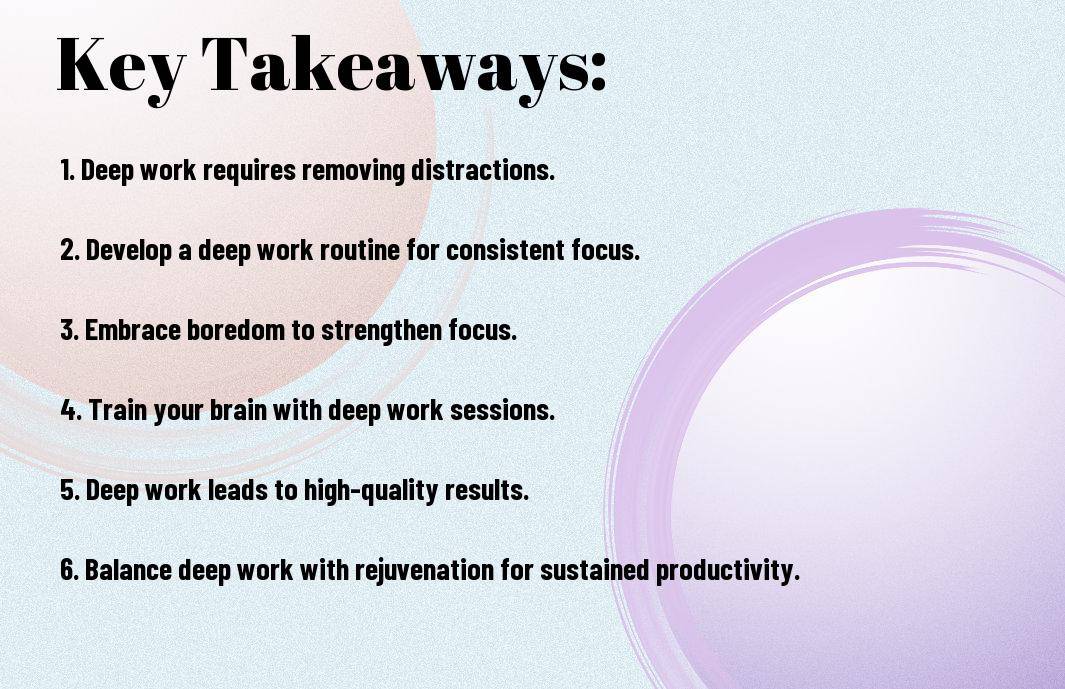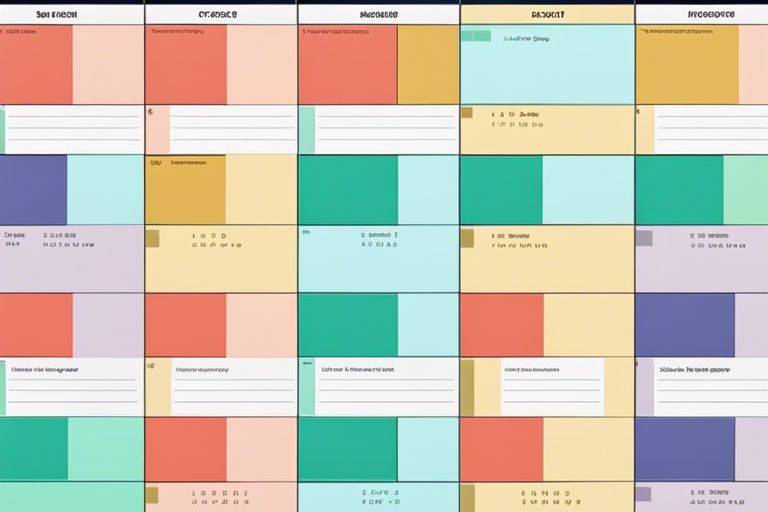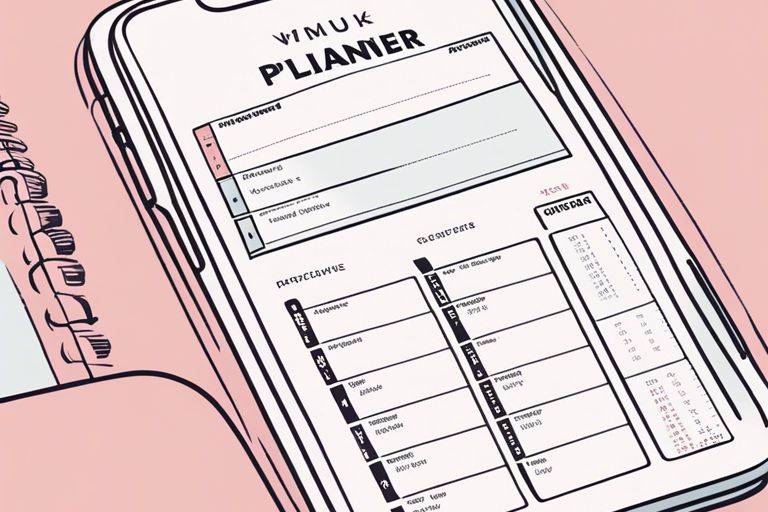Deep Work! Just imagine how much more productive and successful you could be if you could fully concentrate on challenging tasks without any distractions. In his groundbreaking book, ‘Deep Work,’ Cal Newport reveals the secrets to achieving this level of intense focus and productivity. By implementing Newport’s strategies, you can drastically improve your ability to tackle difficult tasks and produce high-quality work.
Key Takeaways:
- Mastering deep work requires deliberate practice: Just like any skill, the ability to focus intensely on complex tasks needs to be cultivated through consistent practice.
- Eliminate distractions to enhance concentration: Create an environment that minimizes interruptions like social media, emails, and unnecessary meetings to boost productivity.
- Establish a routine for deep work sessions: Set specific times each day dedicated to focused work without any disruptions to train your brain for prolonged concentration.
- Embrace boredom to strengthen focus: Allow yourself to become comfortable with boredom by reducing stimuli to increase your ability to concentrate deeply on tasks.
- Use time blocks to schedule deep work: Segment your day into blocks of time dedicated solely to intense, undistracted work to maximize productivity and efficiency.
- Set ambitious goals to challenge your limits: Push yourself to accomplish challenging tasks that require deep work to foster growth and achieve meaningful outcomes.
- Regularly reflect on your deep work habits: Evaluate your progress, adjust your strategies, and continuously improve your deep work skills to achieve long-term success and satisfaction.


Foundations of Deep Work
One of the key concepts discussed in Cal Newport’s book “Deep Work” is the distinction between deep work and shallow work. Deep work refers to the ability to focus without distraction on a cognitively demanding task, while shallow work involves tasks that are logistical in nature and do not require intense concentration. Newport argues that deep work is vital for producing high-quality work and is becoming increasingly rare in today’s society.
Conceptualizing Deep Work and Shallow Work
To maximize productivity and produce valuable output, it is crucial to prioritize deep work over shallow work. By eliminating distractions and dedicating uninterrupted time to focus on demanding tasks, individuals can achieve a state of flow that leads to greater creativity and efficiency. Newport suggests that setting clear boundaries between deep and shallow work and establishing routines that support deep work can help individuals harness their full cognitive potential and achieve remarkable results.
Historical Perspectives on Deep Work
Any examination of deep work should consider historical perspectives on the subject. Throughout history, many influential thinkers and creatives attribute their success to their ability to engage in deep work consistently. From the intense focus of writers like Charles Dickens to the deliberate practice of musicians like Mozart, the practice of deep work has played a crucial role in the development of human knowledge and creativity.
Work conducted by individuals in history often involved long periods of uninterrupted concentration, allowing for the exploration of complex ideas and the creation of groundbreaking works that have stood the test of time. By understanding the historical context of deep work, we can appreciate its importance and learn from the strategies employed by past masters to cultivate our own capacity for deep work in the modern age.
The Deep Work Hypothesis
Unlike shallow work, deep work is the ability to focus without distraction on a cognitively demanding task. In his book “Deep Work,” Cal Newport introduces the Deep Work Hypothesis, which states that the ability to perform deep work is becoming increasingly rare and valuable in our economy. This is due to the rise of technology and the ease of access to information, which has led to a culture of constant distraction and multitasking.
The Benefits of Deep Work
Work conducted in a state of deep work allows individuals to quickly master complicated information and produce better results in less time. By concentrating on demanding tasks without interruption, deep work enhances productivity, creativity, and the ability to learn complex concepts. Moreover, engaging in deep work leads to a sense of fulfillment and satisfaction that is unmatched by shallow work.
Deep Work vs. Shallow Work: A Performance Analysis
One of the key differences between deep work and shallow work is their impact on performance. Shallow work, which involves non-cognitively demanding tasks that are often performed in a state of distraction, provides a false sense of productivity. On the other hand, deep work involves intense concentration and focus on tasks that require cognitive effort, resulting in higher quality output and better long-term results.
Performance analysis reveals that individuals who prioritize deep work over shallow work are able to achieve more significant results and make valuable contributions to their field. The ability to concentrate on demanding tasks without succumbing to distractions gives individuals a competitive edge in today’s knowledge economy, where deep work is increasingly rare and, consequently, highly valuable.
Principles of Deep Work
Work Deeply
One of the fundamental principles of deep work is the ability to concentrate on a demanding task without any distractions. This requires creating a work environment that is conducive to deep focus, where interruptions are minimized, and attention can be fully directed towards the task at hand. By immersing yourself in your work deeply, you can produce higher quality work in less time.
Embrace Boredom
Cultivating the ability to embrace boredom is crucial for deep work. In a world filled with constant stimulation, allowing yourself to feel bored can be a powerful tool for enhancing concentration and creativity. By learning to sit with your thoughts without the need for constant distractions, you can train your brain to focus deeply on challenging tasks.
With practice, embracing boredom can lead to a deeper level of thinking, increased productivity, and a greater capacity for innovative ideas. It may feel uncomfortable at first, but the benefits of embracing boredom far outweigh the initial discomfort.

Strategies for Implementing Deep Work
For individuals seeking to maximize their focus on demanding tasks, implementing deep work strategies is imperative. In his book, “Deep Work,” Cal Newport outlines various methods to help individuals achieve deep work. Two key strategies include The Four Disciplines of Execution and Creating a Deep Work Schedule.
The Four Disciplines of Execution
Execution of The Four Disciplines of Execution involves focusing on a small number of wildly important goals, acting on lead measures, keeping a compelling scoreboard, and creating a cadence of accountability. By concentrating efforts on a few crucial objectives, tracking progress through measurable lead indicators, visualizing achievements on a scoreboard, and establishing regular check-ins, individuals can enhance their ability to engage in deep work consistently.
Creating a Deep Work Schedule
Compelling oneself to adhere to a deep work schedule can significantly impact productivity and efficiency. By designating specific times and locations for deep work sessions, individuals can eliminate distractions and immerse themselves fully in focused work. The key is to establish a routine that works best for one’s unique preferences and habits, ensuring deep work becomes a regular and prioritized part of the daily schedule.
Overcoming Challenges to Deep Work
Many professionals struggle to maintain focus and productivity in a world filled with distractions. To overcome these challenges, it is imperative to implement strategies that promote deep work and minimize interruptions.
Dealing with Distractions
On a daily basis, individuals are bombarded with emails, messages, social media notifications, and other distractions that pull them away from important tasks. To combat these interruptions, it is crucial to create a distraction-free work environment by turning off notifications, setting specific work hours, and utilizing tools like noise-canceling headphones or website blockers. By establishing boundaries and dedicated work time, individuals can optimize their concentration and dive deeply into demanding tasks.
The Myth of Multitasking
One common misconception is that multitasking can enhance productivity. However, research has shown that attempting to juggle multiple tasks simultaneously actually hinders overall performance. When individuals switch between tasks, their focus is divided, leading to decreased efficiency and lower quality output. Embracing deep work means focusing intently on one task at a time, allowing for greater creativity, problem-solving, and productivity.
Measuring Success in Deep Work
All successful deep work practices involve some way of measuring progress and success. This is necessary for staying on track and continuously improving your ability to focus on demanding tasks. In this chapter, we will explore the different tools and strategies for tracking deep work sessions and assessing the output quality of your work.
Tools for Tracking Deep Work Sessions
For those looking to optimize their deep work routine, using tools to track and analyze your work sessions can be highly effective. Apps like Toggl, RescueTime, or Forest can help you monitor the time spent on focused work versus distractions. By setting specific goals and monitoring your progress, you can better understand your work habits and make adjustments to improve your efficiency.
Assessing the Output Quality of Deep Work
For individuals engaged in deep work, it’s crucial to assess not only the quantity but also the quality of the output produced. This involves evaluating the depth of thought, creativity, and problem-solving abilities that went into the work. By soliciting feedback from peers, mentors, or using self-assessment techniques, you can gain valuable insights into the effectiveness of your deep work sessions.
Sessions of deep work that result in high-quality output often require intense focus, creativity, and a sharp attention to detail. By assessing the quality of your work, you can identify areas for improvement and refine your deep work practices to achieve even greater success in the future.

Deep Work in Action
Building a Deep Work-Centered Life
To truly harness the power of deep work, it is necessary to build a lifestyle that prioritizes focused concentration. This means carving out dedicated time in your daily routine where you can engage in undistracted, high-value work. Setting clear goals and creating a conducive work environment are key components to establishing a deep work-centered life. By eliminating distractions and setting boundaries, you can cultivate a mindset that values depth over superficiality.
Maintaining Deep Work in a Distracted World
Deep work requires deliberate effort and discipline, especially in a world filled with distractions. To maintain deep work amidst constant interruptions, it is crucial to practice rituals that minimize external disruptions. This could include setting specific times for checking emails, decluttering your workspace, and using tools to block out digital distractions. By consciously managing your environment and mindset, you can safeguard your focus and productivity in the face of external temptations.
One effective strategy for maintaining deep work in a distracted world is time blocking. This technique involves allocating specific time slots for different tasks, ensuring that you devote uninterrupted periods to deep work. By creating a structured schedule that prioritizes focused work, you can optimize your productivity and achieve better results in less time.
Action
To truly maximize your potential and achieve exceptional results, it is crucial to implement the principles of deep work in your daily life. By building a deep work-centered lifestyle and cultivating strategies to maintain focus in a distracted world, you can unlock your full capabilities and excel in your endeavors.
To wrap up
With these considerations, Cal Newport’s book, Deep Work: Rules for Focused Success in a Distracted World, provides valuable insights and strategies for maximizing focus on demanding tasks. By emphasizing the importance of deep work and offering practical advice on how to cultivate this skill, Newport equips readers with the tools needed to achieve peak productivity in an increasingly distracted world. By implementing the principles outlined in this book, individuals can enhance their ability to concentrate on tasks that truly matter, leading to personal and professional growth.
FAQ
Q: What is deep work?
A: Deep work is the ability to focus without distraction on a cognitively demanding task. It involves working in a state of high concentration that pushes your cognitive capabilities to their limits.
Q: Why is deep work important?
A: Deep work is important because it allows you to produce high-quality work in less time. By eliminating distractions and focusing intensely on the task at hand, you can achieve better results and increase your productivity.
Q: How can I start incorporating deep work into my daily routine?
A: To incorporate deep work into your daily routine, start by identifying your most important tasks and setting aside dedicated time to work on them without interruptions. Create a conducive work environment and establish clear boundaries to minimize distractions.
Q: What are some strategies for maximizing focus during deep work sessions?
A: Some strategies for maximizing focus during deep work sessions include setting specific goals, breaking tasks into smaller, manageable chunks, blocking out distractions, and practicing mindfulness to stay present and focused.
Q: How can I avoid burnout while engaging in deep work?
A: To avoid burnout while engaging in deep work, prioritize regular breaks, practice self-care, maintain work-life balance, and set realistic expectations for yourself. It’s important to recharge and rejuvenate to sustain focus and productivity.
Q: What are the benefits of deep work for professional development?
A: Deep work can lead to significant professional development by enhancing your skills, increasing your knowledge and expertise in your field, and positioning you as a valuable asset in the workplace. It can also boost your confidence and motivation.
Q: How can I overcome challenges and distractions that hinder deep work?
A: To overcome challenges and distractions that hinder deep work, establish a routine, set boundaries with colleagues and technology, prioritize tasks, delegate when necessary, and practice discipline and self-control. It’s necessary to create a conducive environment for deep work to thrive.
Expand Your Knowledge
Flow State – Mihaly Csikszentmihalyi’s Method to Achieve Optimal Focus and Enjoyment
Eisenhower Matrix – Dwight D. Eisenhower’s Strategy to Prioritize Tasks by Urgency and Importance
80/20 Rule (Pareto Principle) – Vilfredo Pareto’s Technique to Focus on High-Yield Tasks
The 50/10 Rule – Managing Work and Break Times for Enhanced Productivity
Unmatched Productivity – Ultimate Guide to Harnessing Your Second Brain



